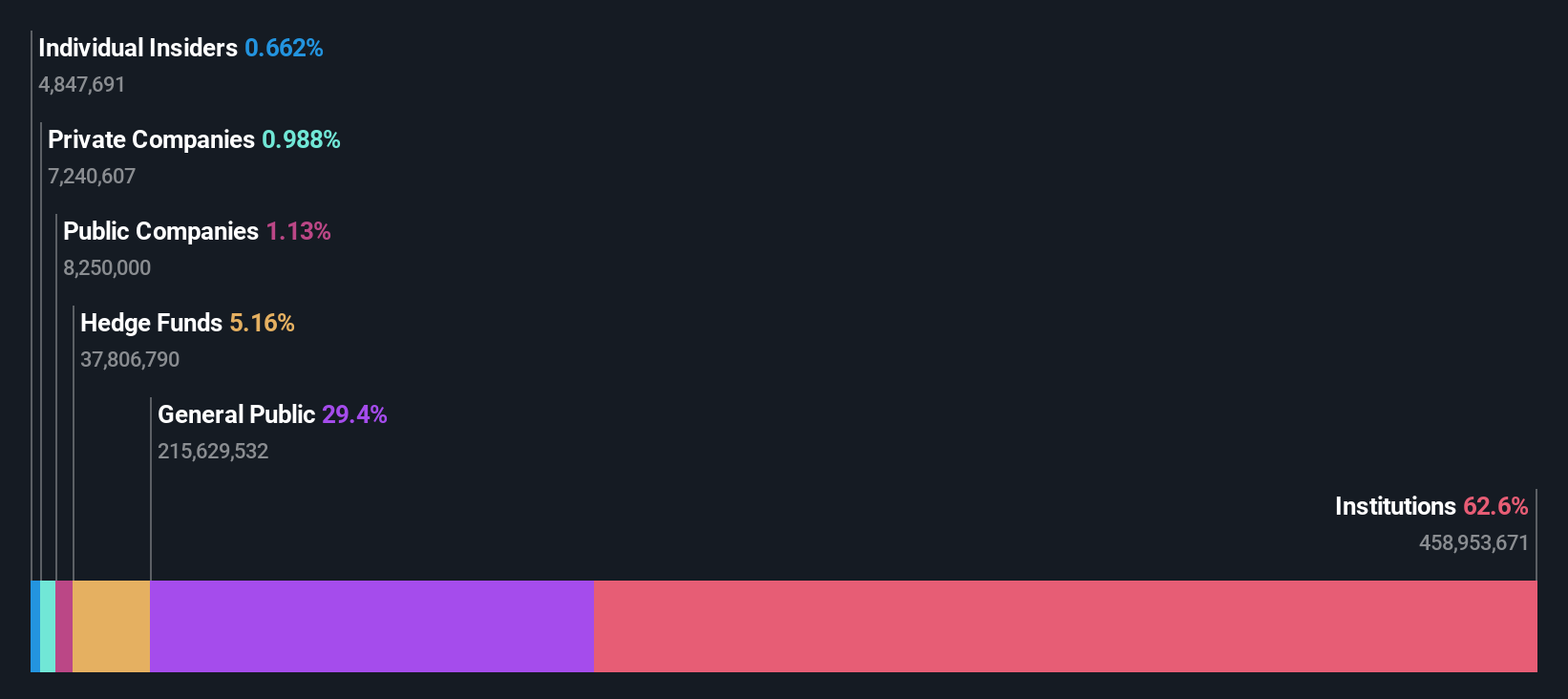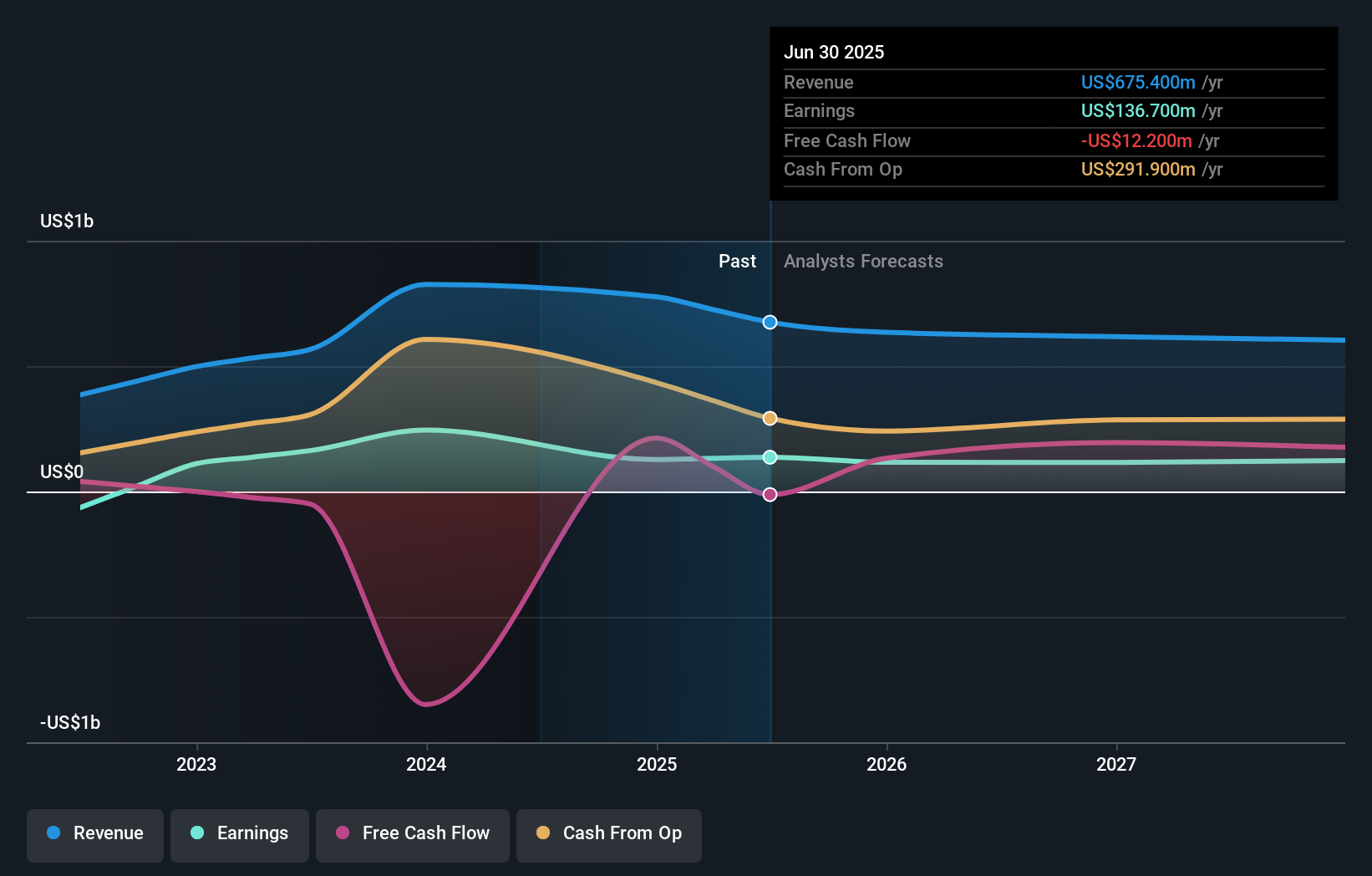- Australia
- /
- Oil and Gas
- /
- ASX:KAR
Institutional shareholders may be less affected by Karoon Energy Ltd's (ASX:KAR) pullback last week after a year of 9.3% returns
Key Insights
- Given the large stake in the stock by institutions, Karoon Energy's stock price might be vulnerable to their trading decisions
- 53% of the business is held by the top 9 shareholders
- Insiders have been buying lately
Every investor in Karoon Energy Ltd (ASX:KAR) should be aware of the most powerful shareholder groups. The group holding the most number of shares in the company, around 63% to be precise, is institutions. That is, the group stands to benefit the most if the stock rises (or lose the most if there is a downturn).
No shareholder likes losing money on their investments, especially institutional investors who saw their holdings drop 12% in value last week. However, the 9.3% one-year return to shareholders may have helped lessen their pain. They should, however, be mindful of further losses in the future.
In the chart below, we zoom in on the different ownership groups of Karoon Energy.
View our latest analysis for Karoon Energy

What Does The Institutional Ownership Tell Us About Karoon Energy?
Institutional investors commonly compare their own returns to the returns of a commonly followed index. So they generally do consider buying larger companies that are included in the relevant benchmark index.
As you can see, institutional investors have a fair amount of stake in Karoon Energy. This can indicate that the company has a certain degree of credibility in the investment community. However, it is best to be wary of relying on the supposed validation that comes with institutional investors. They too, get it wrong sometimes. If multiple institutions change their view on a stock at the same time, you could see the share price drop fast. It's therefore worth looking at Karoon Energy's earnings history below. Of course, the future is what really matters.

Since institutional investors own more than half the issued stock, the board will likely have to pay attention to their preferences. It would appear that 5.2% of Karoon Energy shares are controlled by hedge funds. That catches my attention because hedge funds sometimes try to influence management, or bring about changes that will create near term value for shareholders. Australian Retirement Trust Pty Ltd is currently the largest shareholder, with 8.3% of shares outstanding. With 7.7% and 7.4% of the shares outstanding respectively, State Street Global Advisors, Inc. and First Sentier Investors (Australia) IM Ltd are the second and third largest shareholders.
We also observed that the top 9 shareholders account for more than half of the share register, with a few smaller shareholders to balance the interests of the larger ones to a certain extent.
Researching institutional ownership is a good way to gauge and filter a stock's expected performance. The same can be achieved by studying analyst sentiments. There are plenty of analysts covering the stock, so it might be worth seeing what they are forecasting, too.
Insider Ownership Of Karoon Energy
While the precise definition of an insider can be subjective, almost everyone considers board members to be insiders. Management ultimately answers to the board. However, it is not uncommon for managers to be executive board members, especially if they are a founder or the CEO.
I generally consider insider ownership to be a good thing. However, on some occasions it makes it more difficult for other shareholders to hold the board accountable for decisions.
Our data suggests that insiders own under 1% of Karoon Energy Ltd in their own names. It appears that the board holds about AU$8.1m worth of stock. This compares to a market capitalization of AU$1.2b. Many tend to prefer to see a board with bigger shareholdings. A good next step might be to take a look at this free summary of insider buying and selling.
General Public Ownership
The general public, who are usually individual investors, hold a 29% stake in Karoon Energy. While this size of ownership may not be enough to sway a policy decision in their favour, they can still make a collective impact on company policies.
Next Steps:
It's always worth thinking about the different groups who own shares in a company. But to understand Karoon Energy better, we need to consider many other factors. Take risks for example - Karoon Energy has 3 warning signs (and 1 which makes us a bit uncomfortable) we think you should know about.
If you are like me, you may want to think about whether this company will grow or shrink. Luckily, you can check this free report showing analyst forecasts for its future.
NB: Figures in this article are calculated using data from the last twelve months, which refer to the 12-month period ending on the last date of the month the financial statement is dated. This may not be consistent with full year annual report figures.
Valuation is complex, but we're here to simplify it.
Discover if Karoon Energy might be undervalued or overvalued with our detailed analysis, featuring fair value estimates, potential risks, dividends, insider trades, and its financial condition.
Access Free AnalysisHave feedback on this article? Concerned about the content? Get in touch with us directly. Alternatively, email editorial-team (at) simplywallst.com.
This article by Simply Wall St is general in nature. We provide commentary based on historical data and analyst forecasts only using an unbiased methodology and our articles are not intended to be financial advice. It does not constitute a recommendation to buy or sell any stock, and does not take account of your objectives, or your financial situation. We aim to bring you long-term focused analysis driven by fundamental data. Note that our analysis may not factor in the latest price-sensitive company announcements or qualitative material. Simply Wall St has no position in any stocks mentioned.
About ASX:KAR
Karoon Energy
Operates as an oil and gas exploration and production company in Brazil, the United States, and Australia.
Undervalued with adequate balance sheet.
Similar Companies
Market Insights
Community Narratives



